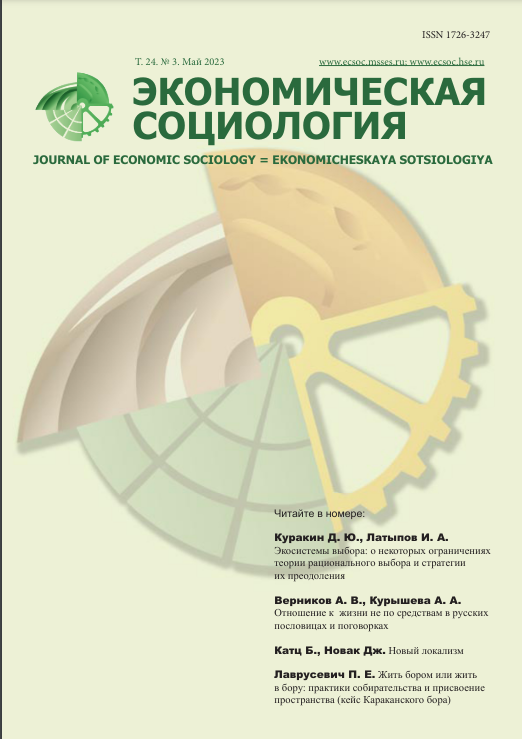To Live with a Pine Wood or To Live in a Pine Wood: Gathering Practices and Space Appropriation (The Case of Karakansky Pine Wood)
Abstract
The study focuses on informal gathering practices employed by different groups of nature management agents on the territory of Karakansky pine wood. Karakansky pine wood is a large forest area located within the borders of the Novosibirsk Region and Altai Territory. The practices, observed among social agents with varying degrees of connection to the pine wood (local residents, summer residents and city dwellers-tourists), offer insights into the mechanisms employed to solve the problem of general access to nature resources—a case akin to the tragedy of commons. The research draws upon observational materials and interviews with pine wood residents collected during sociological expeditions conducted in July–September of 2021 and July 2022. At the core of the appropriation practices lies the concept of “living with the pine wood,” which semantically encompasses both economic and ecological aspects. It highlights the inseparability of resource appropriation and contemplation of their present state and well-being, deterring a predatory mentality of “even the flood if after us” (posle nas khot’ potop, meaning “take everything as far as we are not dealing with consequences.”) Presently, the sustenance of the majority of pine wood inhabitants no longer rely significantly on wild mushrooms and berries. However, symbolically, the availability of forest gifts remains important, emphasizing the perception of nature resources as communal. The professionalization of gathering has been observed, with a distinct group of rural residents standing out as gatherers who sell forest products, collected in the vicinity of the points of sale, to urban dwellers visiting the forest for recreation. As the pine wood space is mastered, a network of transitive property relations emerges, manifesting in the concept of “own places” for foragers within the forest. These “own places” serve as individually mastered and appropriated sections of the forest, situated between private and communal property, and can be characterized as individualized common resources. Functioning as a set of norms and rules for nature management, these “own places” serve to maintain social and ecological balances in the pine wood, i.e. provide conflict-free access to a common resource while ensuring their sustainable utilization by curbing excessive personal consumption.













